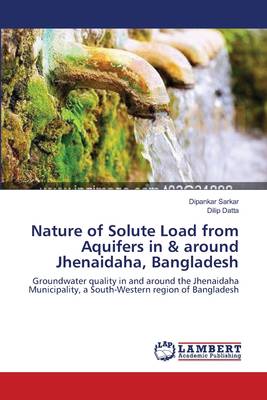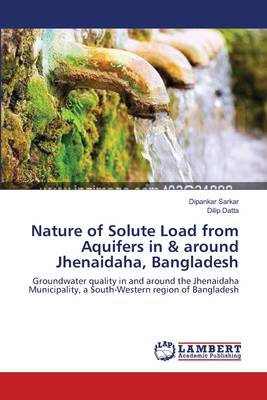
Je cadeautjes zeker op tijd in huis hebben voor de feestdagen? Kom langs in onze winkels en vind het perfecte geschenk!
- Afhalen na 1 uur in een winkel met voorraad
- Gratis thuislevering in België vanaf € 30
- Ruim aanbod met 7 miljoen producten
Je cadeautjes zeker op tijd in huis hebben voor de feestdagen? Kom langs in onze winkels en vind het perfecte geschenk!
- Afhalen na 1 uur in een winkel met voorraad
- Gratis thuislevering in België vanaf € 30
- Ruim aanbod met 7 miljoen producten
Zoeken
Nature of Solute Load from Aquifers in& around Jhenaidaha, Bangladesh
Groundwater quality in and around the Jhenaidaha Municipality, a South-Western region of Bangladesh
Dipankar Sarkar, Dilip Datta
Paperback | Engels
€ 60,95
+ 121 punten
Omschrijving
Groundwater is the most important source of fresh water supply for drinking all over the world. Groundwater samples from different location of Jhenaidaha Municipality have been analyzed to assess the chemical composition, source rock and quality. The parameter analyzed for the research are pH, TDS, EC, Na+, K+, Ca2+, Mg2+, Cl-, HCO3-, SO42-, PO43-, H4SiO4 and NO2-N. The analysis reveals that the cations and anions of the water shows the order of dominance as Ca2+Mg2+ Na+K+ and HCO3-Cl-SO42- respectively. The Na+/ (Na++Ca2+) weight ratio against TDS illustrates that the water is derived mainly from rock weathering; however few samples suggest dominance of evaporation crystallization process. Deduction of source rock demonstrates that carbonate weathering and cation exchange is predominant in almost all over the study area. Piper diagram indicates that the water is rich in Ca2+ + Mg2+ and HCO3- (temporary hard) in the study area. This study reveals that the water quality of shallow aquifers in Jhenaidaha Municipality is quite satisfactory and meets the drinking water standard of Bangladesh and WHO.
Specificaties
Betrokkenen
- Auteur(s):
- Uitgeverij:
Inhoud
- Aantal bladzijden:
- 92
- Taal:
- Engels
Eigenschappen
- Productcode (EAN):
- 9783659221712
- Verschijningsdatum:
- 24/08/2012
- Uitvoering:
- Paperback
- Afmetingen:
- 152 mm x 229 mm
- Gewicht:
- 145 g

Alleen bij Standaard Boekhandel
+ 121 punten op je klantenkaart van Standaard Boekhandel
Beoordelingen
We publiceren alleen reviews die voldoen aan de voorwaarden voor reviews. Bekijk onze voorwaarden voor reviews.









